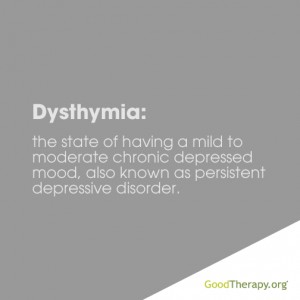Persistent Depressive Disorder (Dysthymia)
 Persistent depressive disorder, also known as dysthymia, is the state of having a mild to moderate chronic depressed mood. According to the Diagnostic and Statistical Manual (DSM), the symptoms of dysthymia are less severe than those of major depression, but the condition, being chronic, also tends to last longer than a major depressive episode.
Persistent depressive disorder, also known as dysthymia, is the state of having a mild to moderate chronic depressed mood. According to the Diagnostic and Statistical Manual (DSM), the symptoms of dysthymia are less severe than those of major depression, but the condition, being chronic, also tends to last longer than a major depressive episode.
Symptoms of Persistent Depressive Disorder (Dysthymia)
The primary diagnostic feature of this condition, as stated in the DSM-5, is a depressed mood, which occurs on more days than it does not, for the better part of the day. The term persistent depressive disorder was introduced in the DSM-5 to represent the combining of what had been listed in previous editions as two separate conditions with remarkably similar symptoms: chronic major depressive disorder and dysthymic disorder. The term dysthymia is still commonly used to refer to what is now labeled persistent depressive disorder.
For dysthymia to be diagnosed, this mood must persist for at least two years, or for one year in the case of an adolescent (who may report feelings of irritability rather than sadness). If symptoms meet the diagnostic criteria for major depressive disorder in this two-year period, both conditions will generally be diagnosed.
This condition is distinguished from major depression by its duration; in other words, it is a chronic form of depression. Symptoms may increase in severity to the level of those experienced in a major depressive episode. Generally, they will once again decrease in severity but will not resolve entirely. Symptoms may vary over the course of the illness, but two or more of the following symptoms will be present consistently in combination with a chronically sad or depressed mood:
- Feelings of hopelessness.
- Depleted energy and lack of interest in hobbies, family, friends, or previously enjoyed activities.
- Low self-esteem.
- Overeating or poor appetite.
- Difficulty concentrating.
- Excessive sleeping or difficulty sleeping.
Often, symptoms of dysthymia can become such a part of daily life that they are not as likely to be reported, unless the person experiencing the symptoms is asked about them directly. It is somewhat common for a person with dysthymia to be unable to remember a time when the condition was not present, and the feelings of depression may have come to feel normal.
What Causes Dysthymia?
Dysthymia often begins with symptoms of traditional depression. It is common among the elderly and among people who are isolated, who have health problems, or who have another mental health condition. The condition appears to be more common in women than in men, and about 5% of the population suffers from dysthymia at least once. The condition may have a genetic element: Having a relative with either dysthymia or major depression appears to increase the likelihood of developing dysthymia. Parental loss or separation in childhood can be a risk factor for this condition, and brain chemistry might also increase a person’s chance of developing major depression or dysthymia.
 Treatment for Dysthymia
Treatment for Dysthymia
Because the symptoms of dysthymia may be less pronounced than the overwhelming depression and suicidal ideation that often characterizes major depression, the condition can sometimes progress significantly before treatment is sought. Those with dysthymia might hold negative beliefs about the world or oneself or have a negative outlook on most aspects of life, but they may not remember a time when they did not feel that way and be unaware that they are experiencing a mental health condition. A delay of up to 10 years before seeking treatment is not uncommon in those who experience dysthymia. Thus, treatment may take longer. Untreated dysthymia also has the potential to progress to major depression.
A combination of therapy and medication can help alleviate the symptoms. Studies indicate that cognitive behavioral therapy (CBT) is especially effective at treating chronic forms of depression. In therapy, any potential causes of dysthymia can be identified and addressed. Spontaneous remission—alleviation of symptoms for no apparent reason—may also occur.
In some cases, a psychiatrist may prescribe medication as a supplemental treatment to therapy: SSRIs are often effective at treating dysthymia, and clinicians may also prescribe other antidepressants such as Wellbutrin or tricyclic antidepressants. An anti-anxiety medication may also be beneficial to some.
References:
- American Psychological Association. (2009). APA Concise Dictionary of Psychology. Washington, DC: American Psychological Association.
- Dysthymia. (2010, November 18). Retrieved from: http://www.ncbi.nlm.nih.gov/pubmedhealth/PMH0001916.
- Highlights of Changes from DSM-IV-TR to DSM-5. (2013). Retrieved from http://www.dsm5.org/Documents/changes from dsm-iv-tr to dsm-5.pdf.
- Persistent Depressive Disorder (Dysthymia). (2013). Diagnostic and Statistical Manual of Mental Disorders, 5th edition. Arlington, Virginia: American Psychiatric Association.
Last Updated: 08-17-2015
- 9 comments
- Leave a Comment
Dean E.
April 21st, 2017 at 6:13 PMSuffer with severe depression and have had suicidal thoughts in past, I have no friends. Been divorced 3 x cant go a day without becoming irritated and angry, verbally abusive to loved ones, Im in severe pain and meds everyday for a decade. Also have a hip replacement, my relationships are great at first , then my wives always pull away and leave me, I cant remember things. Or get motivated to do anything, my wife says Im lazy, sex is great , but seems to be all Im good at. And not always, I spend hours in restroom on computer. Playing games and researching things, I shower but dont clean my house, dont mow the lawn unless my wife forces me to, What can I do? I blame everyone cause they fail me, they dont stick by me, Im a demanding man, jealous and controlling, Im conceated and only want things my way, am I suffering with this ailment? I have been in military, retired 20 year vet, also diagnosed with depression, I had an affair or almost did, talked to someone online for 8 months, then moved away from my wife and demanded an uncontested divorce, Im still married but my wife is hurt and upset about the sex talk and sharing my and her problems with a strange woman and doesnt believe me when I say I didnt cheat, she thinks I would have and says sex talk for 8 months is cheating, I lied about everything so thetes no more trust from her for me, help me, if I divorce again or if she leaves me I want to check oit and become a hermit
Steely D
July 10th, 2017 at 12:59 PMDean- hello friend, have you considered turning to God for comfort? Trust me, it really helps. Even if you have doubts, give Him a chance. Find a quiet place where you can be alone and unburden your heart. You have nothing to lose and everything to gain.
You are a Veteran, so you are a strong man. Even strong men need the Lord. Check out the Mighty Oaks Warrior Programs, it would be perfect for you. Having purpose in life makes all the difference in the world. Humble yourself, soften your heart. Seek out your purpose, the man that you were created to be. I know that when I’m fulfilling my purpose, which is helping others, I feel better mentally and physically, and my relationships are better. When you get back on track, your relationships will be totally different. It would help to have men (Veterans, like you, who have been in your shoes) walk alongside you and help you through it.
Do yourself a favor, check out Mighty Oaks. It’s a non-profit program, free for Veterans. I wish you the best and will keep you in my thoughts and prayers. -Steely
Lori
August 23rd, 2017 at 6:06 PMmy mother is in a severe state a mind of depression n then will kinda put me dopwn my sister quit talking to her n she treats vme awful outta her more less grief n depression n idk what kjind of therapy she needs
Leave a Comment
By commenting you acknowledge acceptance of GoodTherapy.org's Terms and Conditions of Use.
